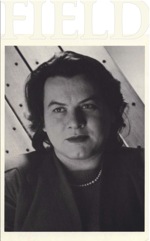
One of the odd and slightly inexplicable aspects of literary culture is the literary magazine, or literary journal. Increasingly beset by digitization, and the loss of university funds, the literary journal as a material artifact very well may be going the way of the LP, the V.H.S. tape, and the business card. The most faithful adherents to literary culture subscribe to multiple journals, or read them in the library, and necessarily so. I know I could do more of it. Each journal is a kind of microbrewery for poetry--bringing together various and often very-unlike poetic styles, generations, and visions of what poetry might do.
A good journal, like Field, which has been around for over forty years, reflects the largesse and care of the editors; among them, David Young and David Walker have been around for quite some time, producing their own esteemed poetry, translations, and edited collections. One of the concepts of Field--and, I'd argue, of good literary magazines--is that the journal is a kind of communication to its readers, and between its writers and editors. This notion is embodied in the very form of the journal: each issue is sandwiched in a personally-addressed postcard, the front of which is the front of the postcard, and the back of which is the back of that postcard, with the message and author intact. There is something plainly beautiful about that idea, that the journal is like a kind of polyphonic postcard--that intimate, that open.
The new issue (85, Fall 2011) features a Symposium on the visionary poet Muriel Rukeyer, including classic poems of hers and essay readings of those poems. Rukeyser is a poet who was almost forgotten, until Adrienne Rich, Jan Heller Levi, and a couple other poets decided to make it their job that another generation of poets had access to her work; I can't recommend her highly enough, and the decision by Field to send us another reminder of why she should not be forgotten.
Other poets in the journal include Betsy Sholl, Laura Kasischke, Alexandra Teague, Georg Trakl (translated by Stephen Tapscott), Karin Gottshall, Chana Bloch, Sarah Barber, Elton Glaser, Sarah Maclay, Sandra McPherson, Philip Metres, Catherine Pierce, Christopher Howell, Cynthia Cruz, Gretchen Primack, Rachel Contreni Flynn, Thorpe Moeckel, Angela Ball, Anna Journey, and others.
Catherine Pierce and Cynthia Cruz's work again caught my eye, as well as the translations of Venus Khoury-Ghata (by Marilyn Hacker)...many, many intriguing poems here.
2 comments:
Thanks for alerting about the issue of Field, of which I hadn't been aware.
I love Muriel Rukeyser's poetry, and was immensely pleased when U. of Pittsburgh issued her Collected Poems a few years back. I've read much of her poetry and still feel that I haven't really gauged the breadth and depth of her work.
I also really like her prose book The Life of Poetry, an exploration of the sources (psychological and material) of poetry, and the nature of poetry, which was the first thing of hers that I read (a little of) many years ago -- more recently I found a new edition of the book, and read it in full.
A few years ago I wrote about Rukeyser in my blog, here, if you care to take a look.
Thanks, Lyle. It's well worth the reminder of Rukeyer's work, and why we need to keep reading her--myself included!
Post a Comment